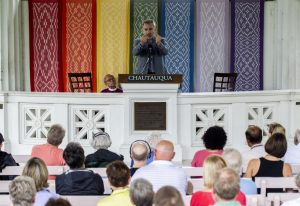
For Week Two’s Interfaith Friday in the Hall of Philosophy, the Rt. Rev. V. Gene Robinson, vice president of religion and senior pastor, posed a series of questions to Mustafa Akyol, who spoke on behalf of Islam.
Akyol is a senior fellow at the Cato Institute Center for Global Liberty and Prosperity, where he focuses on the intersection of public policy, Islam and modernity. A Turkish journalist and author, he has also been a regularly contributing opinion writer for The New York Times since 2013, and a regular opinion columnist for Turkish publications.
Akyol is also the author of Islam Without Extremes: a Muslim Case for Liberty, which was long listed for the 2012 Lionel Gelber Prize and has been published in Turkish, Malay and Indonesian. In 2017, the book was banned in Malaysia after Akyol was arrested for delivering a public lecture defending religious freedom. He is also the author of The Islamic Jesus: How the King of the Jews Became a Prophet of the Muslims, and of six books in Turkish, including Rethinking the Kurdish Question.
What follows is an abridged version of Akyol’s conversation. Akyol and Robinson’s remarks have been condensed for clarity.
Robinson: If we hear about divisions in Islam, we are more used to hearing about the Sunni-Shia divisions. However, how does the division of the Mu‘tazilites and Ash‘arites measure up either in America or around the world? Is one of them a vast majority, and the other a minority?
Akyol: The Mu‘tazila and Ash‘arites had many disputes, and one was on the nature of the Quran. The Mu‘tazila said “Quran is God’s word, but God created Quran in time; he spoke in time.” For the Ash‘arites, the Quran was an uncreated text, which existed with God before time and came down to become a book. … If the Quran was with God since eternity, you have less room to interpret things, whereas in the Mu‘tazila, if the Quran is the word of God, but God spoke to seventh century Arabia — which had its own customs and context and so forth — it is a more interpretable text.
The Ash‘ari and Mu‘tazila are theological schools of thought. Then, there are jurisprudential schools of thought. Then, there’s the big Sunni-Shia division, which to me is about something that’s not that important at all, which is political history. I’m Sunni by background, but the problem in Islam is that politics have defined religion too much from the beginning because, when religion and politics become intertwined, you have problems.
It seems that the Mu‘tazila would be a great approach to modernity and that the Ash‘ari approach would be pretty set in stone, and in some ways at war with modernity. Is it seen that way within Islam?
Let’s be fair. The Ash‘arites have modified themselves over the centuries. Once they defeated the Mu‘tazila, they gave some room for reason, but ultimately, yes, (modernity) is a (building) block for overcoming certain things, like structure of the family. The Quran is not a misogynistic text, but it is patriarchal in the sense that it tells men to be fair to women when they divorce women. Right? So it doesn’t tell women, “When you divorce your husbands.” It says to men, “When you divorce your wives.” Now, an Ash‘ari understanding makes it inevitable that you say “God is implying a social system where men make this decision.” Whereas a created Quran understanding makes it possible to say “well, God was speaking to a patriarchal society and, in that society, men were making those decisions within that context” — and God told men to be very compassionate and give women more rights than they had before. So, that is a more progressive interpretation, if you will. And we have Islamic feminists now in America who are doing these rereadings of the Quran. And yes, Ash‘ari theology is a roadblock on this, but Ash‘ari theology is actually more relatively mild than the most rigid side of Islam, which is called Salafism in the modern world. If you want to make a comparison, with all due respect to the Jewish tradition, this is like the difference between orthodox judaism and ultraorthodox judaism.

In the Jewish scriptures, the people of God are reminding God all the time of what either God promised or God ruled, or they’re calling God to be what they understand God to be. So, does that notion exist throughout the Islamic world?
That notion would be the very Mu‘tazila notion I’m describing. And by the way, it’s interesting that Mu‘tazila theology intrigues Jews to a great extent. There are people called Jewish Mu‘tazila in the medieval era because Maimonides says in his Guide for the Perplexed, “Muslims among themselves discussed one group, the Mu‘tazila, and the other one, the Ash‘ari.” He said, “The Ash‘ari don’t make sense; we agree with the Mu‘tazila.” And I say, “Well, you’ve done the right thing. Good for yourself. Unfortunately, we went the other way.” And, that is partly because of Biblical precedents, because there was never a Jewish king to say, “This is Orthodoxy and I’m imposing it on all of you.” Unfortunately, we had those kings, so, we Muslims generally think that our political power has been a great blessing. I’m saying it’s been a great curse.
Could you describe what a Muslim would say about the notion of salvation; salvation from what, to what; and how does one get it?
First of all, salvation in Islam means going to heaven. There is no earthly redemption idea that there will be a messiah at some point. Muslims believe that Jesus will come back at the end of times — it’s in the Islamic creeds, but it’s not in the Quran. It developed later, and it’s disputable. In Islam, there’s a strong emphasis on act — faith and good acts. That is why, in the New Testament, the letter I find closest to Islamic theology is the letter of James. It has a very law-abiding, good-acts emphasis.
The idea is that you should believe in God. Accepting God’s acceptance and believing in him is fundamental because otherwise, you are being ungrateful to the very creator who made you. And, that is in itself a violation of the biggest moral code. So you should be grateful, believe in God and you should have good acts. What are those acts? Well, feeding the poor, praying and ritual worship. Then, there is a lot of emphasis in the Quran on moral things like freeing a slave. One of the early verses of the Quran defines freeing a slave as one of the great acts that bring you closer to God. From that, Muslims could have inferred an idea of evolution of slavery as an institution — they didn’t. We kept slavery until the 19th century, like most people, unfortunately. But, it was a charitable act for example.
There is the idea of war, jihad; it’s a very controversial concept. If you read the whole Quran and the whole context, what is defined there is a self-defensive war because early Muslims were persecuted. They went to Medina to save themselves; they were again persecuted; there were battles between them and the Pagans. There, jihad was a defensive war against the armies of Mecca, not against women and innocent children. In the past three or four decades, people called jihadists emerged and have attacked women and innocent children. They are murderers and terrorists. They shouldn’t even be associated with the notion of jihad, because jihad has some notion of a just war behind it.
“God is just & merciful, and sometimes we should try and understand his ways, but sometimes they’re just complicated…” pic.twitter.com/HP0O8RKdVv
— The Chautauquan Daily (@chqdaily) July 5, 2019




